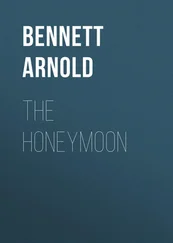"No gloves, of course!" Sophia criticized.
"Well, you can't expect her to have gloves," said Constance.
Then a pause, as the bonnet and dress neared the top of the Square.
"Supposing she turns round and sees us?" Constance suggested.
"I don't care if she does," said Sophia, with a haughtiness almost impassioned; and her head trembled slightly.
There were, as usual, several loafers at the top of the Square, in the corner between the bank and the "Marquis of Granby." And one of these loafers stepped forward and shook hands with an obviously willing Maggie. Clearly it was a rendezvous, open, unashamed. The twelfth victim had been selected by the virgin of forty, whose kiss would not have melted lard! The couple disappeared together down Oldcastle Street.
"WELL!" cried Constance. "Did you ever see such a thing?"
While Sophia, short of adequate words, flushed and bit her lip.
With the profound, instinctive cruelty of youth, Constance and Sophia had assembled in their favourite haunt, the show-room, expressly to deride Maggie in her new clothes. They obscurely thought that a woman so ugly and soiled as Maggie was had no right to possess new clothes. Even her desire to take the air of a Thursday afternoon seemed to them unnatural and somewhat reprehensible. Why should she want to stir out of her kitchen? As for her tender yearnings, they positively grudged these to Maggie. That Maggie should give rein to chaste passion was more than grotesque; it was offensive and wicked. But let it not for an instant be doubted that they were nice, kind-hearted, well- behaved, and delightful girls! Because they were. They were not angels.
"It's too ridiculous!" said Sophia, severely. She had youth, beauty, and rank in her favour. And to her it really was ridiculous.
"Poor old Maggie!" Constance murmured. Constance was foolishly good-natured, a perfect manufactory of excuses for other people; and her benevolence was eternally rising up and overpowering her reason.
"What time did mother say she should be back?" Sophia asked.
"Not until supper."
"Oh! Hallelujah!" Sophia burst out, clasping her hands in joy. And they both slid down from the counter just as if they had been little boys, and not, as their mother called them, "great girls."
"Let's go and play the Osborne quadrilles," Sophia suggested (the Osborne quadrilles being a series of dances arranged to be performed on drawing-room pianos by four jewelled hands).
"I couldn't think of it," said Constance, with a precocious gesture of seriousness. In that gesture, and in her tone, was something which conveyed to Sophia: "Sophia, how can you be so utterly blind to the gravity of our fleeting existence as to ask me to go and strum the piano with you?" Yet a moment before she had been a little boy.
"Why not?" Sophia demanded.
"I shall never have another chance like to-day for getting on with this," said Constance, picking up a bag from the counter.
She sat down and took from the bag a piece of loosely woven canvas, on which she was embroidering a bunch of roses in coloured wools. The canvas had once been stretched on a frame, but now, as the delicate labour of the petals and leaves was done, and nothing remained to do but the monotonous background, Constance was content to pin the stuff to her knee. With the long needle and several skeins of mustard-tinted wool, she bent over the canvas and resumed the filling-in of the tiny squares. The whole design was in squares--the gradations of red and greens, the curves of the smallest buds--all was contrived in squares, with a result that mimicked a fragment of uncompromising Axminster carpet. Still, the fine texture of the wool, the regular and rapid grace of those fingers moving incessantly at back and front of the canvas, the gentle sound of the wool as it passed through the holes, and the intent, youthful earnestness of that lowered gaze, excused and invested with charm an activity which, on artistic grounds, could not possibly be justified. The canvas was destined to adorn a gilt firescreen in the drawing-room, and also to form a birthday gift to Mrs. Baines from her elder daughter. But whether the enterprise was as secret from Mrs. Baines as Constance hoped, none save Mrs. Baines knew.
"Con," murmured Sophia, "you're too sickening sometimes."
"Well," said Constance, blandly, "it's no use pretending that this hasn't got to be finished before we go back to school, because it has." Sophia wandered about, a prey ripe for the Evil One. "Oh," she exclaimed joyously--even ecstatically--looking behind the cheval glass, "here's mother's new skirt! Miss Dunn's been putting the gimp on it! Oh, mother, what a proud thing you will be!" Constance heard swishings behind the glass. "What are you doing, Sophia?"
"Nothing."
"You surely aren't putting that skirt on?"
"Why not?"
"You'll catch it finely, I can tell you!"
Without further defence, Sophia sprang out from behind the immense glass. She had already shed a notable part of her own costume, and the flush of mischief was in her face. She ran across to the other side of the room and examined carefully a large coloured print that was affixed to the wall.
This print represented fifteen sisters, all of the same height and slimness of figure, all of the same age--about twenty-five or so, and all with exactly the same haughty and bored beauty. That they were in truth sisters was clear from the facial resemblance between them; their demeanour indicated that they were princesses, offspring of some impossibly prolific king and queen. Those hands had never toiled, nor had those features ever relaxed from the smile of courts. The princesses moved in a landscape of marble steps and verandahs, with a bandstand and strange trees in the distance. One was in a riding-habit, another in evening attire, another dressed for tea, another for the theatre; another seemed to be ready to go to bed. One held a little girl by the hand; it could not have been her own little girl, for these princesses were far beyond human passions. Where had she obtained the little girl? Why was one sister going to the theatre, another to tea, another to the stable, and another to bed? Why was one in a heavy mantle, and another sheltering from the sun's rays under a parasol? The picture was drenched in mystery, and the strangest thing about it was that all these highnesses were apparently content with the most ridiculous and out-moded fashions. Absurd hats, with veils flying behind; absurd bonnets, fitting close to the head, and spotted; absurd coiffures that nearly lay on the nape; absurd, clumsy sleeves; absurd waists, almost above the elbow's level; absurd scolloped jackets! And the skirts! What a sight were those skirts! They were nothing but vast decorated pyramids; on the summit of each was stuck the upper half of a princess. It was astounding that princesses should consent to be so preposterous and so uncomfortable. But Sophia perceived nothing uncanny in the picture, which bore the legend: "Newest summer fashions from Paris. Gratis supplement to Myra's Journal." Sophia had never imagined anything more stylish, lovely, and dashing than the raiment of the fifteen princesses.
For Constance and Sophia had the disadvantage of living in the middle ages. The crinoline had not quite reached its full circumference, and the dress-improver had not even been thought of. In all the Five Towns there was not a public bath, nor a free library, nor a municipal park, nor a telephone, nor yet a board- school. People had not understood the vital necessity of going away to the seaside every year. Bishop Colenso had just staggered Christianity by his shameless notions on the Pentateuch. Half Lancashire was starving on account of the American war. Garroting was the chief amusement of the homicidal classes. Incredible as it may appear, there was nothing but a horse-tram running between Bursley and Hanbridge--and that only twice an hour; and between the other towns no stage of any kind! One went to Longshaw as one now goes to Pekin. It was an era so dark and backward that one might wonder how people could sleep in their beds at night for thinking about their sad state.
Читать дальше











